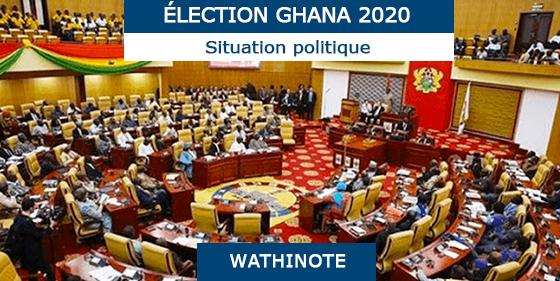Ghana’s Political Landscape: Navigating Power, Influence, and Accountability
Introduction
Table of Contents
Ghana, located in West Africa, has a vibrant and multifaceted political system. It has transitioned from military rule to democratic governance, with multi-party elections becoming the norm since 1992. Understanding the intricacies of Ghana’s political landscape is crucial for navigating power, influence, and accountability within the country. This article delves into the key elements and challenges of Ghana’s political system, providing insights into the interplay between power structures, influence networks, and the mechanisms of accountability.
Key Elements of Ghana’s Political system
Ghana’s political landscape is characterized by the following key elements:
- The Constitution: Ghana’s 1992 constitution serves as the supreme law of the land, outlining the structure and principles of government. It establishes the separation of powers between the executive, legislative, and judicial branches and guarantees fundamental human rights and freedoms.
- Multi-Party Democracy: Ghana operates a multi-party democratic system, with multiple political parties contesting elections for parliamentary seats and the presidency. The National Democratic Congress (NDC) and the New Patriotic Party (NPP) have been the dominant parties in recent decades.
- The Executive Branch: The President, elected by popular vote, leads the executive branch and appoints a cabinet to assist in governing the country. The President holds critically important executive powers, including the authority to initiate legislation, veto bills passed by Parliament, and appoint key officials.
- The Legislative Branch: The Parliament of Ghana is the country’s legislative body, composed of 275 members elected from single-member constituencies. Parliament’s primary function is to make laws, approve the national budget, and provide oversight of the executive branch.
- The Judicial Branch: Ghana’s judicial system is modeled on the British common law system and consists of the Supreme Court, lower courts, and specialized tribunals. The independence of the judiciary is essential for upholding the rule of law and ensuring accountability.
Power and Influence in Ghana’s politics
Within Ghana’s political system, power and influence are wielded by various actors:
- Political Parties: The NDC and NPP are the most influential political parties, controlling a majority of seats in Parliament and holding the presidency. They have significant influence on policy-making and resource allocation.
- The President: As the head of the executive branch, the President wields considerable power. They can control the political agenda,appoint key officials,and lead the country’s foreign policy.
- The Elite: Ghana’s political elite, including high-profile politicians, wealthy businesspeople, and conventional leaders, exert influence through their connections, access to resources, and ability to shape public opinion.
- Civil Society Organizations: Non-governmental organizations (NGOs), advocacy groups, and civil society organizations play a crucial role in influencing public policy through lobbying, advocacy campaigns, and grassroots mobilization.
accountability in Ghana’s Political System
Accountability is a vital element of any democratic system. In Ghana, accountability mechanisms include:
- Elections: Regular elections provide citizens with the opportunity to hold elected officials accountable by voting them out of office.
- Oversight by Parliament: Parliament has the power to summon ministers, question government policies, and investigate alleged cases of corruption or misuse of power.
- Self-reliant Judiciary: The independence of the judiciary is crucial for upholding the rule of law and ensuring that those in power are held accountable for their actions.
- Auditor-General’s Reports: The Auditor-general’s periodic reports on the use of public funds highlight cases of financial irregularities and promote accountability within government agencies.
- Media and Civil Society: The media and civil society organizations play a significant role in monitoring government activities, exposing corruption, and holding leaders accountable.
Challenges to Ghana’s Political Landscape
Despite Ghana’s progress towards democratization, its political landscape faces several challenges:
- Electoral Irregularities: Concerns over electoral fraud, voter intimidation, and vote buying continue to undermine confidence in the electoral process.
- Political Polarization: The heightened political polarization between the NPP and NDC can hinder effective governance and compromise decision-making.
- Corruption: Corruption remains a significant challenge in Ghana, with allegations of bribery, extortion, and embezzlement tarnishing the public perception of government officials.
- Weak Accountability Mechanisms: While accountability mechanisms exist, their effectiveness can be limited by political interference, lack of resources, and cultural factors that favor loyalty over clarity.
case Study: The Anas Aremeyaw Anas Exposé
In 2015, Ghanaian investigative journalist Anas Aremeyaw Anas released an exposé exposing widespread corruption within ghana’s judicial system. The exposé, which involved undercover filming, led to the dismissal and imprisonment of over 30 judges and other court officials. this case highlights the important role of the media in holding those in power accountable.
- Understand the political landscape and key power structures.
- Engage with political actors and institutions through formal and informal channels.
- Build relationships and alliances with key stakeholders.
- Respect local customs and cultural protocols.
- Stay informed about current events and political developments.
Conclusion
Ghana’s political landscape is a complex and evolving one. Understanding the dynamics of power, influence, and accountability is crucial for navigating the political system effectively. By strengthening electoral integrity, promoting transparency, and empowering accountability mechanisms, Ghana can continue to consolidate its democratic governance and ensure that those in power are held accountable for their actions.

